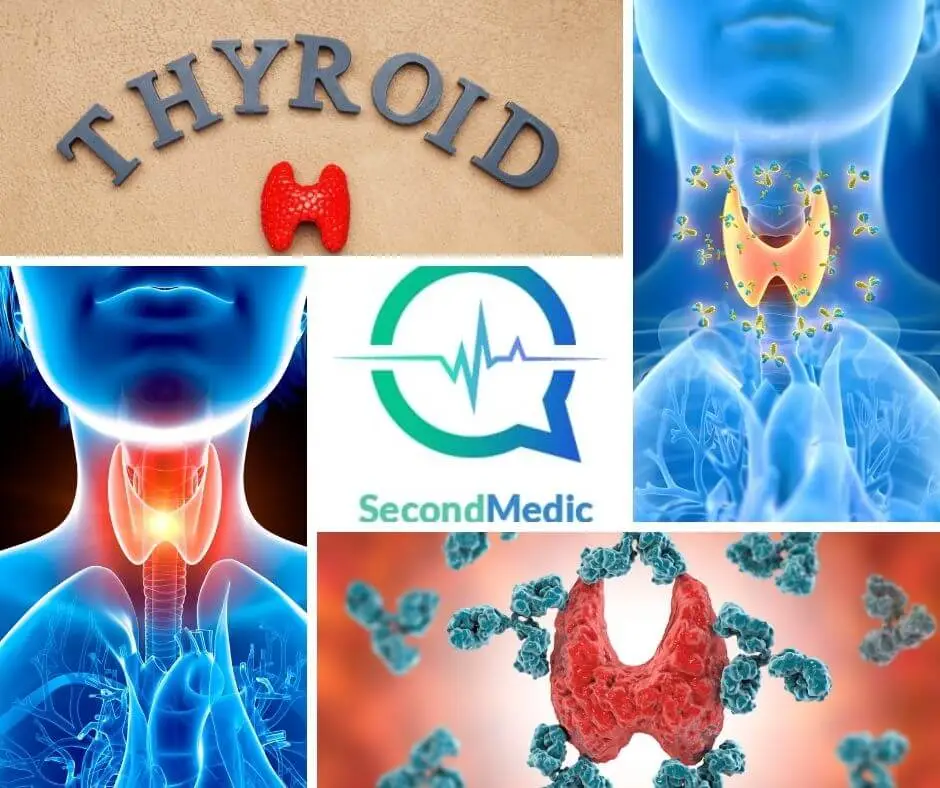Thyroid Disease: Causes, Symptoms, Risk Factors, Testing | SecondMedic
Thyroid disease is a condition that affects the thyroid gland, which is located in the front of your neck.
There are a number of causes for thyroid disease, including autoimmune diseases, radiation exposure, and iodine deficiency. Some risk factors include having a family history of thyroid disease, being female (thyroid disease is more common in women), and being over the age of 60. Symptoms can vary depending on the type of thyroid disease but may include weight gain or loss, fatigue, hair loss, constipation, and muscle weakness.
Thyroid Function Test can be tested through a blood test that measures levels of TSH (thyroid-stimulating hormone). If TSH levels are high it suggests that the thyroid is not working properly and further testing may be necessary to diagnose the specific type of thyroid disease.
Thyroid disease is a condition that affects the thyroid gland, which is located in the front of your neck. The thyroid gland produces hormones that help control your body's metabolism. There are several different types of thyroid diseases, including hyperthyroidism, hypothyroidism, goiter, and thyroid cancer.
Some common causes of thyroid disease include autoimmune diseases (such as Hashimoto's disease), radiation therapy to the head or neck, medications that contain iodine (such as amiodarone and lithium), and surgery to remove the thyroid gland.
There are many causes of thyroid disease, including autoimmune diseases, infection, radiation therapy, and thyroid nodules. The most common cause is autoimmune disease, which occurs when the body's immune system mistakenly attacks the thyroid gland. Symptoms of thyroid disease vary depending on the type and severity of the condition. Some common symptoms include fatigue, weight gain or loss, hair loss, constipation, and difficulty swallowing.
Risk factors for thyroid disease include family history of thyroid disease, previous neck surgery or radiation therapy to the head or neck area, and diabetes. Thyroid function can be tested with a blood test called a TSH level. This test measures the level of TSH in your bloodstream. There are a few different things that can cause thyroid disease, including autoimmune diseases, radiation exposure, and iodine deficiency. Some of the symptoms of thyroid disease include weight gain or loss, fatigue, hair loss, and changes in mood.
Some of the risk factors for thyroid disease include being female, being overweight or obese, having a family history of thyroid disease, and being over the age of 60. Thyroid disease is often diagnosed with a blood test that measures levels of thyroid-stimulating hormone (TSH) in the blood.
There are a number of different things that can cause thyroid problems.
Here are some of the most common ones:
- Autoimmune diseases (Hashimoto's thyroiditis is the most common type)
- Radiation therapy to the head or neck
- Iodine deficiency
- Graves' disease (an autoimmune disease that causes an overactive thyroid)
- Thyroid nodules or lumps (these can be caused by a number of different things, including iodine deficiency, radiation therapy, and autoimmune diseases)
- goiter (an enlarged thyroid gland)
The most common symptoms of thyroid problems are changes in weight, changes in appetite, fatigue, mood changes, muscle weakness, and hair loss. Thyroid disease is a disorder that affects the thyroid gland. The thyroid gland is located in the front of your neck. It produces hormones that help regulate your body's metabolism.
There are several causes of thyroid disease, including autoimmune diseases, radiation therapy, and surgery. Symptoms include weight gain or loss, fatigue, hair loss, and changes in mood. Risk factors for thyroid disease include a family history of the disorder and having other autoimmune diseases. Testing for thyroid disease includes a complete blood count test to measure levels of thyroid-stimulating hormone (TSH) and thyroxine (T4).
The most common cause is an autoimmune disorder called Hashimoto's thyroiditis. Other causes of thyroid disease include: radiation therapy to the head or neck, iodine deficiency, pregnancy, and surgery to remove part or all of the thyroid gland. Some other common symptoms of thyroid disease include fatigue, weight gain or loss, hair loss, mood swings, and constipation.
Originally Posted :- SecondMedic Blogs


Comments
Post a Comment